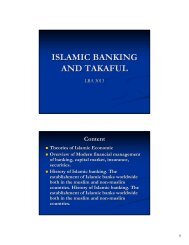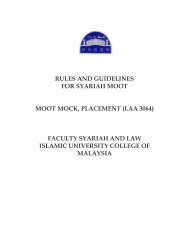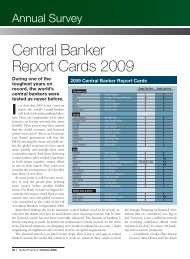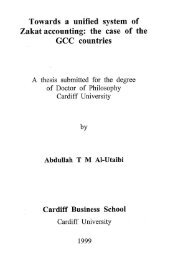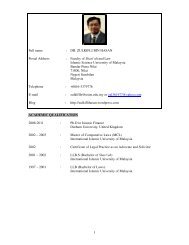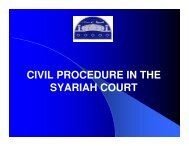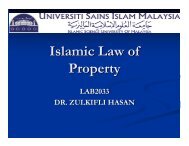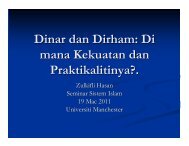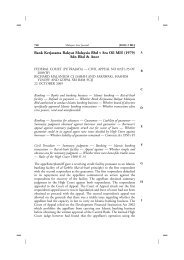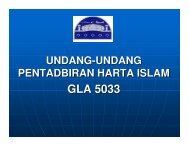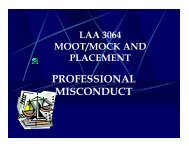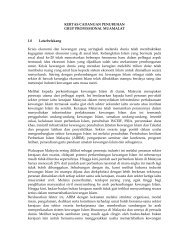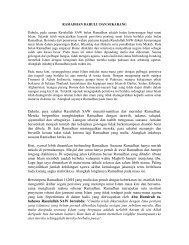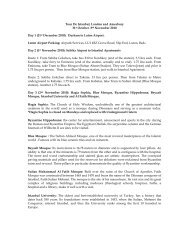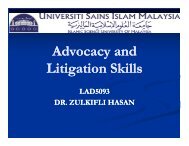Nomination
Nomination
Nomination
Create successful ePaper yourself
Turn your PDF publications into a flip-book with our unique Google optimized e-Paper software.
Islamic Law of<br />
Property<br />
LAB2033<br />
DR. ZULKIFLI HASAN
<strong>Nomination</strong><br />
Conceptual Framework<br />
Content<br />
The practice of nomination
Introduction<br />
<strong>Nomination</strong> or penamaan-<br />
Insurance<br />
Joint account<br />
EPF<br />
Tabung Haji<br />
Cooperative Societies
<strong>Nomination</strong><br />
The process by which a person who has taken<br />
up insurance policies or saved monies in such<br />
bodies (eg. EPF, insurance co, takaful co. )<br />
names certain persons to benefit from such<br />
insurance policies or savings in the event of his<br />
death.
Types of nomination<br />
1. Which has the effect of a nomination of a life<br />
insurance policy made under S 23 of the CLA<br />
1956.<br />
2. Statutory nomination. EPF Act 1991 and CSA<br />
1993.
<strong>Nomination</strong> under S 23<br />
A policy insurance effected by any man on his own life<br />
and expressed to be for the benefit of his wife or<br />
children or by any woman on her own life and<br />
expressed to be for the benefit of her husband or<br />
children shall create a trust in favour of the objects<br />
therein named.<br />
Part XIII of the Insurance Act 1996: allows licensed<br />
insurance co to pay to the nominees instead of<br />
beneficiaries.<br />
Apply to non-Muslim: S 23 is automatically triggered<br />
resulting the creation of a trust as soon as the<br />
requirements are satisfied.<br />
Muslims: the position is different
Re Yeo Hock Hoe [1938] MLJ 33<br />
A man may insure his life at anytime for their<br />
benefit and any monies payable under the policy<br />
shall not go to pay his debts, but shall be held in<br />
trust for his family…. Even when it is proved<br />
that the policy was effected and the premiums<br />
paid with intent to defraud creditors of the<br />
insured, the fact will not defeat the trust but the<br />
creditors will be entitled to receive only the sum<br />
actually paid by way of premiums.
Conflicting Decision on <strong>Nomination</strong><br />
involving Muslims<br />
Re Man Minhat [1965] 2 MLJ 1<br />
Re Bahadun Hj Hassan [1974] 1 MLJ 14<br />
Re Ismail Rentah [1940] MLJ 77
Re Man Minhat [1965] 2 MLJ 1<br />
Muslims nominated his wife to receive the proceeds of<br />
insurance policy after his death.<br />
Suffian Hashim J. applied s 23 CLA.<br />
If there is no legal objection to a muslim altering his<br />
heir’s share by himself during his lifetime by making a<br />
gift through his trustees to a favoured wife, equally<br />
there would be no objection in principle to the validity<br />
of a similar gift made not by himself but by statute.<br />
Comment: Judge failed to differentiate btn gift inter<br />
vivos and s 23.
Re Bahadun Hj Hassan [1974] 1 MLJ 14<br />
Application by the Official administrator for<br />
wtr s 23 policy taken by a Muslim to his wife was<br />
valid 2.<br />
If valid, wtr the money could be paid to this wife or<br />
considered as estate.<br />
Abd Hamid J.<br />
The W could take the insurance moneys<br />
beneficially and would not form part of the<br />
estate.
Re Ismail Rentah [1940] MLJ 77<br />
<br />
<strong>Nomination</strong> made by a muslim. The Deceased- member of<br />
cooperative society and had nominated his daughter to be the<br />
benificiary.<br />
<br />
His daughter and six others claimed- estate.<br />
Raja Musa J:<br />
<br />
<strong>Nomination</strong> did not confer a right on the nominee to take<br />
beneficially, as the daughter not merely held the money as trustee<br />
for all the beneficiaries.<br />
<br />
The money of the deceased were to be divided among all the<br />
beneficiaries. A gift mortis causa is treated as a disposition by<br />
will.<br />
<br />
The nomination could not be treated as a gift inter vivos because<br />
there was never any transfer to the donee.
A gift mortis causa<br />
A gift of personal property in prospect of death,<br />
a death-bed disposition,<br />
an inchoate gift of personal consummated by<br />
the giver’s death.<br />
The ct in the case Re Ismail Rentah concluded<br />
that nomination was a gift mortis causa.
Observation<br />
3 different fatwas on nomination:-<br />
1. Pahang, Selangor, N.9 and Kedah- the<br />
property forms part of the residuary property of<br />
the deceased and therefore must be divided<br />
according to faraid.<br />
2. Kelantan and Perak- nomination under the<br />
EPF is regarded as gift that will take effect upon<br />
death.<br />
3. N. 9 and Kedah- nomination arising from<br />
insurance. Estate property and faraid.
Fatwa on <strong>Nomination</strong><br />
Kelantan in 1962, Perak, Pahang, Selangor, N.9,<br />
Kedah, FT including National Fatwa Council in<br />
9 october 1973.<br />
Nominees of the funds in EPF, Post Office Saving<br />
Banks, Insurance and Co-operative operative Societies are in the<br />
position of persons who carry out the will of the deceased<br />
or the testator. They can receive the money of the deceased<br />
from the sources stated to be divided among the persons<br />
entitled to them under the Islamic law of inheritance.
cont<br />
117 th Conference of Rulers 1980: recommended<br />
the AG to amend the laws to reflect the fatwa.<br />
Amendments were made to the relevant<br />
legislation on nominations affecting muslims.
Insurance policy holders<br />
B4 S 167: no difference as the effects of<br />
nomination made by Muslim and non-muslim.<br />
S 167: Under the Insurance Act 1996: Muslim<br />
policyholder can appoint a nominee, as an<br />
executor and not as the beneficiary.<br />
The monies form part of the deceased’s estate.<br />
To distribute in accordance with faraid.
Co-operative operative Societies<br />
Co-operative operative Societies Act 1993: S 24 resolves the issue<br />
on nomination. <strong>Nomination</strong>s are not applicable to<br />
Muslim members.<br />
On the death of the a member, the society may transfer<br />
the shares of such a member:-<br />
Muslim: to the legal representative of such member or a<br />
person entitled to such share pursuant to any distribution<br />
made under the law relating to faraid.<br />
Non-Muslim: to the person nominated.<br />
If the society is unable to ascertain the legal rep (6<br />
months after the death of the member) the society may<br />
pay to the ARB.
EPF<br />
<strong>Nomination</strong>s are allowed for Muslim and non-muslims<br />
under the EPF Act 1991.<br />
Regulation 6 of the EPF Regulations 1991: a member<br />
of the fund may nominate any natural person to receive<br />
his credit due to him at his death.<br />
S 16 (3): when a Muslim member dies after having<br />
made a nomination in accordance with the Regulations,<br />
the persons nominated shall receive the credit of such<br />
deceased member as an executor and not as a<br />
beneficiary and shall distribute the credit in accordance<br />
with the Islamic law.
Cont..<br />
Rule 34 of the EPF Rules 1991: Form EPF4-<br />
shall be signed by the member of the fund in the<br />
presence of witness.<br />
Cautionary statement- For members who are<br />
muslims, the nominee elected will be treated as an<br />
executor/ administrator to the member’s credit.
How Yew Hock v Lembaga KWSP<br />
[1996] 2 MLJ 474<br />
Legal effect to non-muslims.<br />
It was contended by counsel for the executor and<br />
trustee of the deceased that the EPF nomination in<br />
favour of his sister was a form of testamentary<br />
disposition of the deceased’s property and the<br />
document must comply with the Wills Act 1959.<br />
Disposition of the prop under Reg 9 was inconsistent<br />
with the Wills Act and therefore void.<br />
The nomination was a statutory nomination under the<br />
EPF Act, the nomination was valid.
Saniah bt Ali & Ors v Abdullah Ali<br />
[1990] 3 MLJ 135<br />
The deceased nominated the first pt (sister) to<br />
receive the entire amount of the CPF on his<br />
death. The CPF paid out the money to the Pt<br />
pursuant to the Spore CPF Act 1985.<br />
Dt: Under 112 (1) of the Spore admin of Muslim<br />
Law act 1985- muslims dying intestate- faraid.<br />
Issue: wtr the pt was entitled to the entire<br />
amount of the CPF’s money.<br />
Ct held that the CPF’s money was excluded<br />
from the estate of the deceased.
Joint Accounts in Banks<br />
Common law principle: when one joint-account holder<br />
dies, the funds in the account will be subject to the<br />
survivorship principle.<br />
Rationale: when funds are kept in joint bank account,<br />
there is prima facie presumption that the funds in the<br />
account constitute the joint prop- a right of<br />
survivorship attaches to the account.<br />
Effect:<br />
if one party dies, the survivor is in ordinary cases entitled to<br />
the whole amount either the law devolution (rebutted by<br />
evidence of contrary intention) btn joint owners or by the<br />
custom of bankers and express and implied agreement.
Survivorship Principle from Syariah<br />
It is a gift mortis cause and is to be treated as a<br />
testamentary disposition.<br />
The bank mandate which supports the survivorship<br />
principle under a joint account reflects nothing more<br />
than a nomination by one person that the other shall<br />
benefit from his death.<br />
If one party dies, the deceased’s money is regarded as<br />
the asset of the estate of the deceased and will be<br />
distributed in accordance with faraid.
Rosmawati Sharibun & Satu lagi [2002] 4 AMR 4913<br />
2 petitioners applied for the grant of LOA. They were the<br />
immediate beneficiaries of the estate of Dato Sharibun, the<br />
deceased. Dato died on 2.1.2000, leaving behind one W<br />
(Latifah) and 8 children. When he died the deceased left<br />
behind millions of ringgit worth of property. Dispute to<br />
who was entitled to apply for the LOA. The beneficiaries<br />
agreed to divide all the assets according to faraid except the<br />
monies held jointly by the Deceased and W. The W<br />
claimed that the joint accounts were hers as hibah.<br />
Held: there was evidence to prove that the joint account<br />
was not a hibah. The monies belonged to the estate of the<br />
deceased.
Tabung Haji<br />
The effect of nomination- bequest.<br />
Fulfill all the requirements of bequest.
Wan Puziah v Wan Abdullah Muda & Seorang Lagi<br />
(2001) JH 235<br />
The Pt (adopted daughter) claimed one half share<br />
of the savings of the deceased in the LUTH<br />
account. The pt averred that her claim was based<br />
on nomination made by the deceased in 1975.<br />
The dt contended that the nomination was not a<br />
bequest and the pt as not being a waris was not<br />
entitled to have share in the distribution.<br />
Held: the nomination in favour of pt satisfied all<br />
requirements of a wassiyah under hukum syarak.<br />
<strong>Nomination</strong> in favour of the pt was a bequest.



